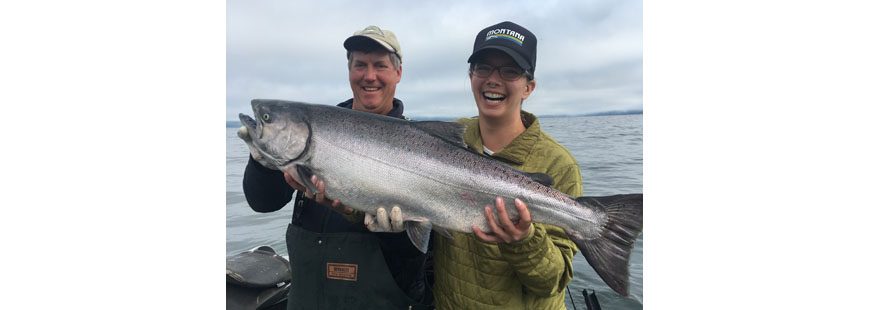Amy Baird with a 21-pound lower Columbia River Chinook caught on 8/10/16 with pro guide Bob Rees
It’s smoldering hot in my hometown near Portland, OR right now. I’m chomping at the bit to head back to the coast, where cooler breezes and biting salmon are about to grace my vessel, to ply the lower Columbia for a small fraction of the 900,000 Chinook and coho that are due here over the next 6 weeks. It’s Buoy 10 time, and rods are already buckling.
After two decades of full-time guiding, I find it more rewarding to guide the peak part of the season, and spend my other 10 months in pursuit of better policy to ensure there is a future for fisher-men, women and children. Can’t say I have my 8-year old fully invested in how fun fishing is, but hopefully that changes later this month. I hope she catches her first Chinook salmon, the king of all salmonids.
With my guiding schedule dramatically cut back, I find myself more appreciative of the resource and my clientele base. Just last month, I left the Astoria area with a nice paycheck for a day’s work, and an overwhelmed family that left well worn out from fighting huge sturgeon all day. It was an experience that they’d never had before, and likely won’t ever have again. I built my business, and a house and other assets, on the backs of the Columbia’s salmon and sturgeon. As I left Astoria, I was taken aback by the privilege I had to make a living off of this natural resource, especially after never killing a sturgeon on a day’s catch and release fishing trip.
So many of us owe this resource a great amount of respect for how it has built our communities and sustained our families, and I’m just not so sure everyone appreciates it as we should. Sure, there are plenty of people who understand that what we have here in the Pacific Northwest is unique; for many of us, it’s why we live here.
So, how do we stop taking this incredible resource for granted? Like any addiction, admitting there is a problem is the first step.
These resources are now clearly finite. The only animal on the planet that is thriving is human beings, and somehow we have to strike a balance with using our resources. Regulation is our biological backstop to ensure we have a resource for the future. The United States may be the only country in the world where we have the luxury of not needing to exploit our fishery stocks in order to feed our nation. That’s a luxury certainly not all of the world’s population can adhere to.
Wikipedia offers some pretty incredible statistics on how US fisheries perform. Most notable is the fact that Congress identified overfishing as a problem as early as 1871, but it wasn’t until a century later that it enacted the Magnuson-Stevens Act, enabling the federal government to actually start managing our nation’s fish stocks. (And I thought Congress was dysfunctional in today’s world…).
Yes, that’s right, intensive usage of our fisheries went unchecked for over a century. More accessible stocks saw their first major crash (salmon, halibut, sardines, and the list goes on…) many decades ago. Thankfully, we learn from our mistakes, and historically policy-makers who have cared about the communities they represent have taken appropriate action. A shout out to Warren Magnuson, a Washington state representative and senator and Ted Stevens, an Alaska senator who both served many decades in Washington DC. That’s right, a Democrat and a Republican who saw eye to eye on the need to manage billion dollar industries for the sake of a finite resource. I guess things operated differently in D.C. during their tenures.
After several decades of fisheries management success, both industry and the conservation community are on board with business as usual. Of course there is always justification for tweaks to a law that hasn’t been reviewed for over a decade, but the success speaks for itself. It seems that, on almost an annual basis, we’re seeing depressed stocks of fish rebuild faster than statistical models had predicted. It’s a welcome bit of news compared to how climate models are indicating the opposite for how our ecosystems are reacting, and how terrestrial and wetland species are in rapid decline.
So, as we enter the season’s and states’ (Oregon and Washington) most productive fishing period, let’s appreciate what we have by not taking more than we can use, not letting any catch get freezer-burned and go to waste, and appreciating the laws we have in place that are meant to keep this resource thriving, for future generations to enjoy.
In the Northwest, we have a highly capable group of fishery managers and in most cases, a motivated bunch of lawmakers who understand the value of our fisheries. Let’s keep it that way. Enjoy the abundant salmon return this season, but view it as a privilege, not a right. We are the guardians of this resource for our 8-year old daughters and granddaughters, and theirs after that.


